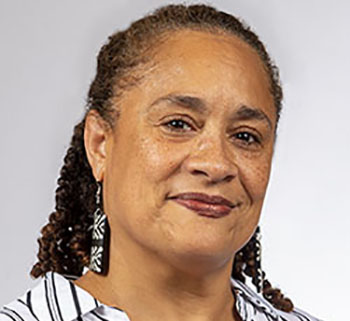
April Langley, Chair of the Department of Black Studies and an associate professor of English.
Langley is also an affiliate in the departments of Religious Studies and Women and Gender Studies and a member of Faculty Council on the Inclusion, Diversity & Equity committee.
Looking back at recent semesters, Langley says, “Black Studies has dealt with at least two major challenges—the double pandemic of anti-blackness and COVID-19. Both have impacted our mission and those students, staff, faculty, and communities we serve. The deaths of Breonna Taylor, Layleen Polanco, Tony McDade, and most viscerally George Floyd have traumatized and brought to the surface underlying issues right here at Mizzou”.
How did her department tackle these dual challenges?
She says, “While it might not be accurate to say we have ‘overcome’ these challenges because many of them we are still dealing with, it would be correct to say that we as a department have brought our interdisciplinary strengths to the table as a way to address challenges. Our faculty and staff came together to talk about how we could help, and we asked students what their needs were, and we are fortunate to have an amazing department administrator and director of undergraduate study as well as faculty whose actions demonstrate they are invested in being a village of those who are genuinely concerned.”
Some of the ways they did this were: to offer all of the core courses in the Black Studies program in Fall 2020 to help students achieve their requirements in one semester and held the “Black and Proud at Mizzou” event in July on Zoom in response to student comments on #BlackAtMizzou, which the department hopes to continue annually.
What has emerged from this period in time? Langley says, “…the idea of community must be more than any idea, or one set of rules or circumstances that bring us together, rather reactively, when incidents create an urgency. Community, at least the way I see it, is about common unity. It is a coming together to create the place, space, and worlds we imagine our best selves inhabiting, not in a moment, but as a viable and ongoing movement. What we’ve managed to accomplish, our students, staff, faculty, administrators, and those communities we serve, in COVID should provide wonderful breadcrumbs that empower us through the best as well as the worst of times.”